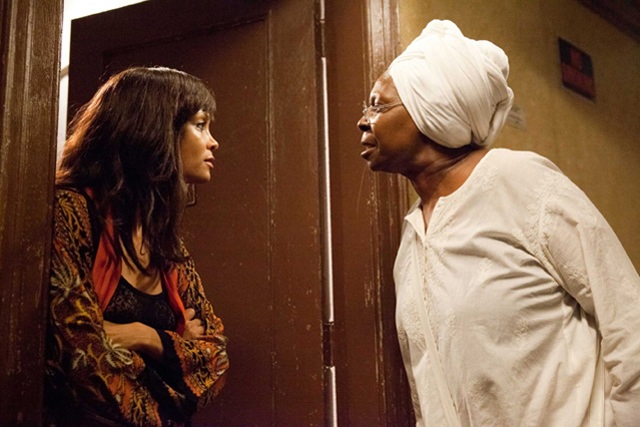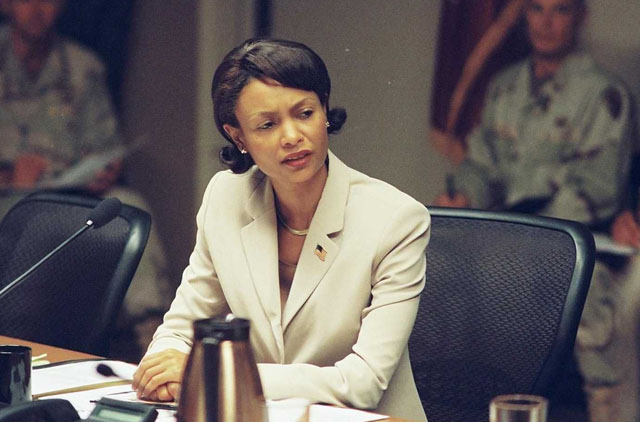CHICAGO – Patrick McDonald of HollywoodChicago.com appears on “The Morning Mess” with Dan Baker on WBGR-FM (Monroe, Wisconsin) on March 21st, 2024, reviewing the new streaming series “Manhunt” – based on the bestseller by James L. Swanson – currently streaming on Apple TV+.
Interview: Thandie Newton on the Passion of ‘For Colored Girls’
CHICAGO – The expansive and intuitive prose poetry of Ntozake Shange’s “For Colored Girls Who Have Considered Suicide When the Rainbow is Enuf” comes to life in Tyler Perry’s film adaptation “For Colored Girls.” Thandie Newton portrays Tangie (color Orange) and saturates the character with a precise truth.
Newton is familiar to audiences as a performer in many notable films. After making a memorable debut in the Australian film “Flirting” (1992), she has been featured in “Jefferson in Paris” (1995), “Beloved” (1998), “Mission Impossible II” (2000), the TV show “ER,” “The Pursuit of Happyness” (2006) and as Condoleeza Rice in “W.” (2008). She might be best remembered for her role as Christine in the Oscar winning Best Picture of 2005, “Crash.”
 Photo Credit: Quantell Colbert for © Lionsgate |
Thandie Newton was in Chicago recently to promote For Colored Girls. HollywoodChicago got the opportunity to explore the film with her.
HollywoodChicago.com: This film is about the development of survival techniques in the face of soul and life crushing circumstances. What did you admire about Tangie in the way that she handled her situation and the way she eventually survived?
Thandie Newton: I did not admire how she handled her situation at all, which was why I found it hard initially to play her. I couldn’t get into the sympathy vibe at all, and once you start treating people badly, that is your wake-up call. For me, that’s when you need to reflect.
I didn’t know I was going to do the film until a couple days before I started, they had already shooting. But it was also great because there was a feeling of frustration and discomfort that I completely put into the role. The way she behaves is her coping strategy and I do admire her for having any way to cope with her history. You realize in the climatic scene between her and Whoopi [Goldberg, playing her mother in the film] that she hasn’t talked about this with anybody. You wonder if she had been in a form of denial about it herself. She obviously hasn’t dealt with it.
HollywoodChicago.com: What life choices of Tangie stood out as you were formulating the character?
Newton: You see the choices she has made. Money is of great importance. There is some kind of status with how many people she sleeps with and how she’s able to reject men…she takes pride in the fact that she’s not a victim. But of course she is a victim. She’s a complicated unconscious person. I felt it was a real value to play a character that was deep in her unconscious self sabotage.
Everyone is at different stages in their evolution in the movie. Most women have a sense of what their crap is and come to terms with it. Tangie has no idea, but she does at the end, so you do get a sense that there will be some type of catharsis.
HollywoodChicago.com: The title of the film almost sounds esoteric, toward a specific group of women. But in looking at this story as they try to reclaim their lives, do you see this as more of a universal theme?
Newton: Absolutely. For the playwright Ntozake Shange it started with what she knew, when she wrote it in the 1970s, among women studies and African-American studies. I’m English, and I didn’t know anything about the play until [director] Tyler Perry called me, it wasn’t in my cultural bibliography. So when I read it, it had huge relevance, and it resonated for me, even though it’s 2010 and not 1975. I do think it has universal themes, and in terms of the title of the movie, it is ironic, and what the work is really about is exploding stereotypes.
What Ntozake really meant when she called it ‘For Colored Girls…,’ was [the character names] red, orange, yellow, green, brown, white, purple and blue. That’s an invitation to look beyond the stereotype of ‘girls colored.’ We can go as far out as we want…let’s include men, let’s embrace all races and religions. Because frankly which country, which religion or which group doesn’t experience this kind of self sabotage and victimization.
HollywoodChicago.com: Since you were raised in England, what lessons did you have to learn about American racism when you first started working here?
Newton: Racism is racism wherever you go. Perhaps African American issues are so different because it stems from slavery. But it’s important to tackle the issue today, because it is universal. I’m glad that racism has been made illegal, that you can get a criminal record if you involved in any racist victimization.
Specific to the movie and the role, it’s actually quite nice to be in a movie which is specifically about black Americans, and there is no racism in there. It’s about how we effect each other, not about how we’re victimized. It’s a big deal to have a movie about black Americans and not have it be about race.
 Photo Credit: Sidney Ray Baldwin for © Lionsgate |
HollywoodChicago.com: In performing the character of Condoleeza Rice in ‘W.,’ what did you end up admiring about her and on the opposite spectrum, not admiring about her?
Newton: I didn’t know a huge amount about her, again because I’m from England. When I came to research Condi I had to rely heavily on research, because I didn’t have an opinion about her. I read biographies, watched documentaries, Charlie Rose and YouTube clips in unguarded moments. I got a really interesting portrayal together and what I ended up creating in the characterization, was that I was filtering everything that I researched. I don’t think it’s a particularly flattering portrait, but that’s what I came to believe. I was deeply disappointed that all her potential got channeled into that administration at the critical moment in history, which is still being felt massively today. I just felt deep disappointment and that hasn’t changed.
HollywoodChicago.com: I wanted to talk about your film ‘Beloved.’ What are you recollections of working with Jonathan Demme on that film?
Newton: Amazing. You know sometimes you can do something and realize that afterward it was amazing? I knew at the moment that this was the biggest challenge, the biggest opportunity based on a book that I loved and it was life and career changing. I’m really proud of everything I did in that film. It was as rewarding as it was challenging. So it was extremely rewarding.
That character was super hard to tackle. I’m glad it was in a point in my life where I didn’t have kids and I could really focus and really engage. Everything I had done up until then I used, my degree in Anthropology became powerfully important in how I got to the role. I embodied it utterly and it was very cathartic, too.
I didn’t feel a lot of trust for directors at that point in my life. I was suspicious and cynical about the power dynamic between directors and actors. But Jonathan Demme completely revived my faith, trust and joy in that collaboration.
HollywoodChicago.com: You once said you don’t derive pleasure in life from the movies, but you enjoy it as a career. Since you work rather selectively, how is the business for you today? How do you know when you want to do a project?
Newton: My career has a wonderfully accidental flow to it, I get knocked around but I make the choices as to where I go. There is never a formula to the next one, the more I work with people, the more people I meet and the more films that I make, I’m in the company of like-minded filmmakers. I find myself everything feels right now, this is where I should be. Working with Tyler Perry at this point feels right now.
Because I’m open, there is something very valuable about the fact that I worked twenty years doing this. That is good and bad. I’m not the new ingenue anymore, but I am tried and tested. I think I’ve earned my stripes in that I can’t be pigeonholed, and I’m very grateful for that. Also that I can still change and do different things. For me it’s all about changing. I don’t want to do the same thing, I want life to be different and interesting.
I appreciate learning about different people and situations through the work that I do. I never know what’s going to happen but I am really open. You know how if you are open and just try to be in the moment as possible then things come, as in if I predicted this or wanted it to happen, it exactly what would have happened. I feel like I’m in that place right now.
 | By PATRICK McDONALD |


